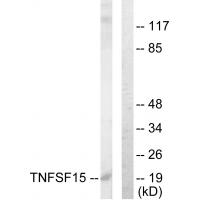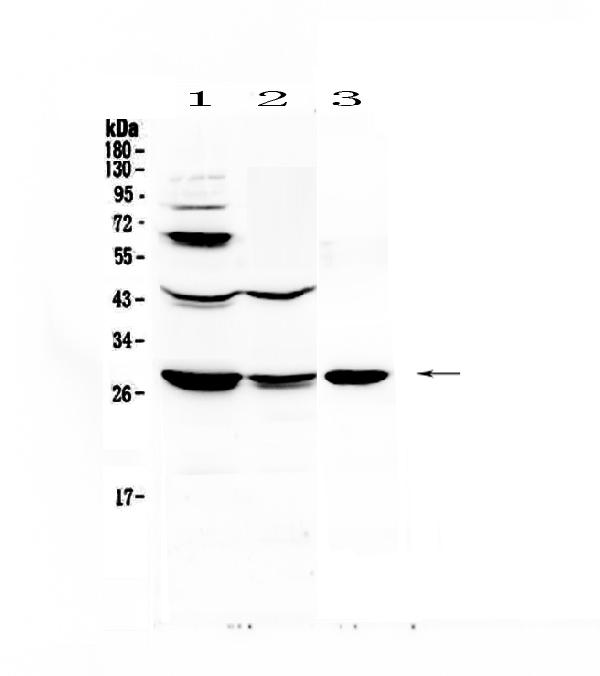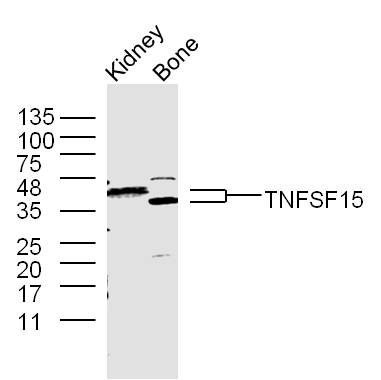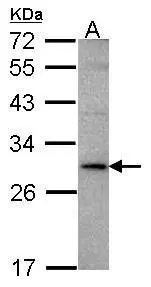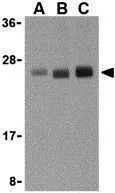![IHC-P analysis of human parathyroid mass tissue using GTX35124 TL1A antibody [VEGI/1283]. IHC-P analysis of human parathyroid mass tissue using GTX35124 TL1A antibody [VEGI/1283].](https://www.genetex.com/upload/website/prouct_img/normal/GTX35124/GTX35124_20200115_IHC-P_920_w_23060801_382.webp)
IHC-P analysis of human parathyroid mass tissue using GTX35124 TL1A antibody [VEGI/1283].
TL1A antibody [VEGI/1283]
GTX35124
ApplicationsImmunoHistoChemistry, ImmunoHistoChemistry Paraffin
Product group Antibodies
ReactivityHuman
TargetTNFSF15
Overview
- SupplierGeneTex
- Product NameTL1A antibody [VEGI/1283]
- Delivery Days Customer9
- Application Supplier NoteIHC-P: 1-2microg/ml for 30 minutes at RT. *Optimal dilutions/concentrations should be determined by the researcher.Not tested in other applications.
- ApplicationsImmunoHistoChemistry, ImmunoHistoChemistry Paraffin
- CertificationResearch Use Only
- ClonalityMonoclonal
- Clone IDVEGI/1283
- Concentration0.2 mg/ml
- ConjugateUnconjugated
- Gene ID9966
- Target nameTNFSF15
- Target descriptionTNF superfamily member 15
- Target synonymsTL1, TL1A, TNLG1B, VEGI, VEGI192A, tumor necrosis factor ligand superfamily member 15, TNF ligand-related molecule 1, TNF superfamily ligand TL1A, tumor necrosis factor (ligand) superfamily, member 15, tumor necrosis factor ligand 1B, tumor necrosis factor superfamily member 15, vascular endothelial cell growth inhibitor, vascular endothelial growth inhibitor, vascular endothelial growth inhibitor-192A
- HostMouse
- IsotypeIgG1
- Protein IDO95150
- Protein NameTumor necrosis factor ligand superfamily member 15
- Scientific DescriptionThe protein encoded by this gene is a cytokine that belongs to the tumor necrosis factor (TNF) ligand family. This protein is abundantly expressed in endothelial cells, but is not expressed in either B or T cells. The expression of this protein is inducible by TNF and IL-1 alpha. This cytokine is a ligand for receptor TNFRSF25 and decoy receptor TNFRSF21/DR6. It can activate NF-kappaB and MAP kinases, and acts as an autocrine factor to induce apoptosis in endothelial cells. This cytokine is also found to inhibit endothelial cell proliferation, and thus may function as an angiogenesis inhibitor. Two transcript variants encoding different isoforms have been found for this gene. [provided by RefSeq, Feb 2011]
- ReactivityHuman
- Storage Instruction-20°C or -80°C,2°C to 8°C
- UNSPSC41116161

![IHC-P analysis of human colon carcinoma tissue using GTX35124 TL1A antibody [VEGI/1283]. IHC-P analysis of human colon carcinoma tissue using GTX35124 TL1A antibody [VEGI/1283].](https://www.genetex.com/upload/website/prouct_img/normal/GTX35124/GTX35124_20200115_IHC-P_505_w_23060801_998.webp)


